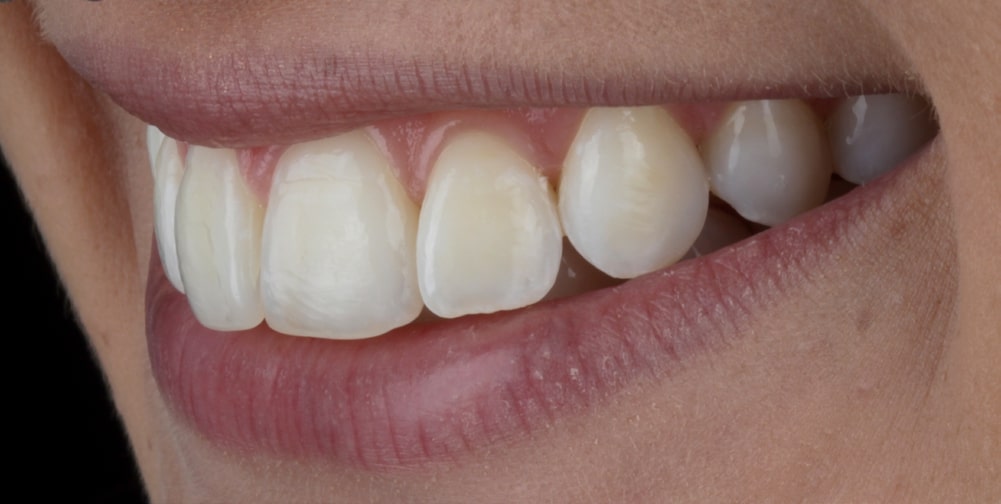Many oral problems can stem from the stresses of daily life. Stress can cause you physical symptoms like headaches and abdominal pain, or simply leave you on edge. However, stress can also wreak havoc on your mouth, teeth, gums, and overall health. The main side effects of stress and anxiety that affect your oral health include:
- Mouth sores, including canker sores and cold sores
- Teeth clenching and grinding (bruxism)
- Poor oral hygiene and harmful eating habits
- Periodontal disease or exacerbation of existing periodontal disease
Learn now how to prevent oral health problems.
Mouth Sores
Canker sores – small whitish ulcers with red edges – appear in the mouth in quantities of one or two, or sometimes even more. Although experts still don’t know what causes canker sores – it could be low immunity, bacteria, or viruses – they believe that emotional stress can contribute to their appearance in the mouth. Canker sores are not contagious.
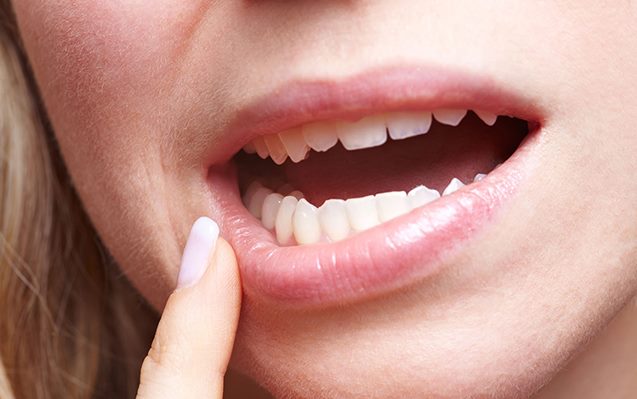
Most canker sores disappear in 7 to 10 days. To relieve irritation, use over-the-counter topical anesthetics. To reduce irritation, avoid eating highly spicy and hot foods, as well as acidic foods like tomatoes and citrus fruits.
Oro-labial herpes simplex is caused by the HSV-1 virus and is contagious. The lesions are characterized by vesicles and blisters that appear on the lips, but can also emerge around the oral cavity.
Emotional stress can trigger herpes outbreaks. The condition can also be triggered by fever, ultraviolet radiation, skin abrasions, menstruation, prolonged use of antibiotics, and weakened immunity.
Similar to canker sores, herpes usually disappears in about a week. There is treatment available, consisting of antiviral medications, with or without a prescription. Consult your doctor or dentist to determine the best option for your case. It’s important to start treatment as soon as the first symptoms of the disease appear, such as increased sensitivity, ‘burning,’ and itching in the lip area.
Bruxism
Bruxism is a condition that affects many people, especially those who experience high levels of stress. The involuntary habit of grinding or clenching teeth can cause a range of oral and overall health problems.
One of the most common consequences of bruxism is headaches, often felt in the temporal region or the back of the head. Additionally, excessive teeth clenching can lead to jaw pain and the sensation that facial muscles are tired or tense.
Another consequence of bruxism is dental wear, which can result in tooth sensitivity, pain, cavities, and other dental issues. Bruxism can also cause temporomandibular joint (TMJ) problems, known as temporomandibular dysfunction (TMD), leading to pain when opening the mouth, chewing, or speaking.
Fortunately, there are ways to prevent and treat bruxism. Using mouth guards or occlusal splints can help protect teeth from wear and reduce muscle tension. Additionally, cognitive-behavioral therapy can address underlying stress and anxiety contributing to bruxism.
If you suspect you might be suffering from bruxism, it’s important to consult a dentist or physician for proper diagnosis and treatment. Don’t ignore the symptoms, as bruxism can have a significant impact on both your oral and overall health.
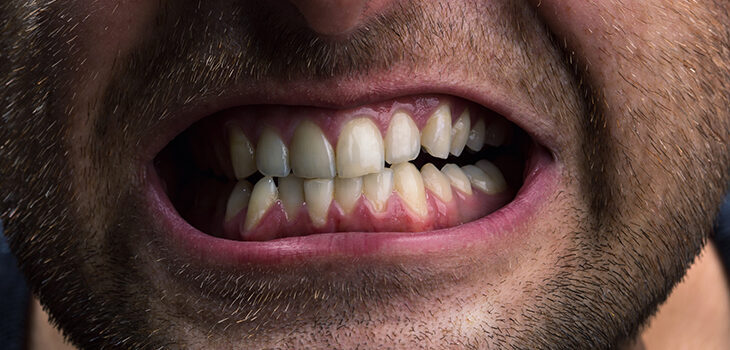
Periodontitis
In addition to bruxism, stress can contribute to the development of various periodontal diseases, such as periodontitis, which is a chronic inflammatory condition that affects the gums and the supporting tissues of the teeth.
Stress can have a significant impact on the immune system, compromising its ability to fight bacterial infections in the mouth. This makes the body more susceptible to periodontal diseases, including gingivitis and periodontitis.
Periodontitis is a disease that can cause irreversible damage to the supporting tissues of the teeth, including bone and ligaments. If not properly treated, periodontitis can lead to tooth loss and even systemic health issues, such as heart and respiratory diseases.
Fortunately, there are ways to prevent and treat periodontitis. Brushing and daily flossing are essential to remove bacterial plaque from the teeth and gums. Additionally, it’s important to regularly visit the dentist for routine exams and professional cleanings, which can help identify and treat periodontitis in its early stages.
If you’re experiencing gum pain or inflammation, consult a dentist immediately. The earlier periodontitis is diagnosed and treated, the higher the chances of successful treatment and the lower the risk of complications for both oral and overall health.
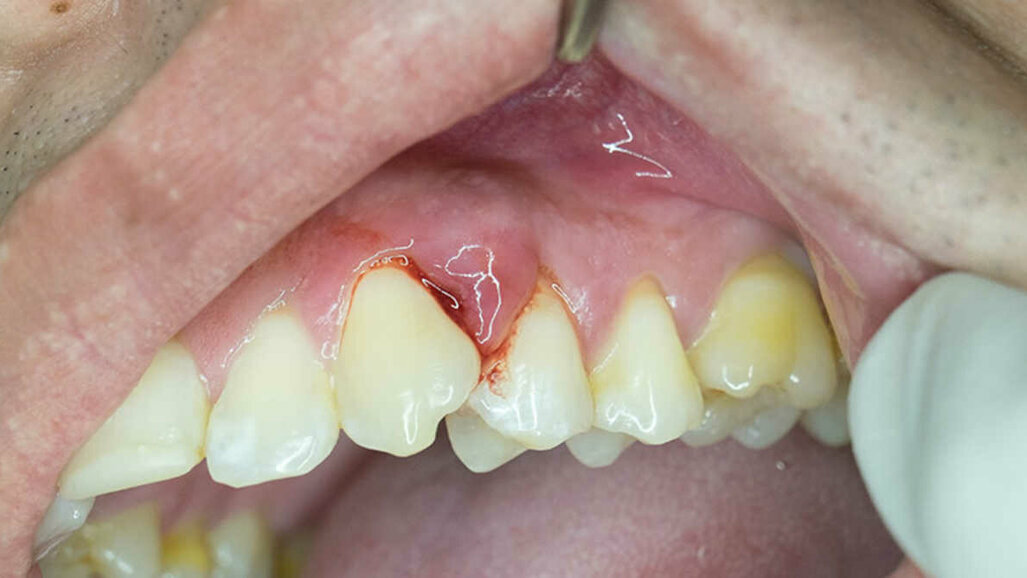
Dental Caries and Bad Breath
In addition to periodontitis and bruxism, stress can have a significant impact on other oral issues, such as dental caries (cavities) and bad breath.
Stress can lead to changes in eating habits, such as consuming sugary foods and carbonated drinks, which can promote the growth of harmful bacteria in the mouth. This can increase the risk of dental caries, especially if oral hygiene is inadequate.
Furthermore, stress can negatively affect oral hygiene, leading to improper brushing or forgetting to use dental floss regularly. These poor habits can contribute to the formation of bacterial plaque on the teeth and gums, contributing to the development of dental caries and bad breath.
Bad breath, also known as halitosis, can be an embarrassing and challenging issue. While it can have multiple causes, stress can be a contributing factor as it may affect saliva production in the mouth, leading to dryness and unpleasant odor.
Maintaining good oral hygiene and a healthy diet is crucial to prevent these oral problems. This includes brushing your teeth at least twice a day, using dental floss daily, limiting the consumption of sugary and carbonated foods and drinks, and regularly visiting the dentist for check-ups and professional cleanings.
If you’re concerned about any of these oral issues, it’s important to talk to your dentist. They can help you identify the underlying cause of the problem and provide personalized guidance for prevention and treatment.
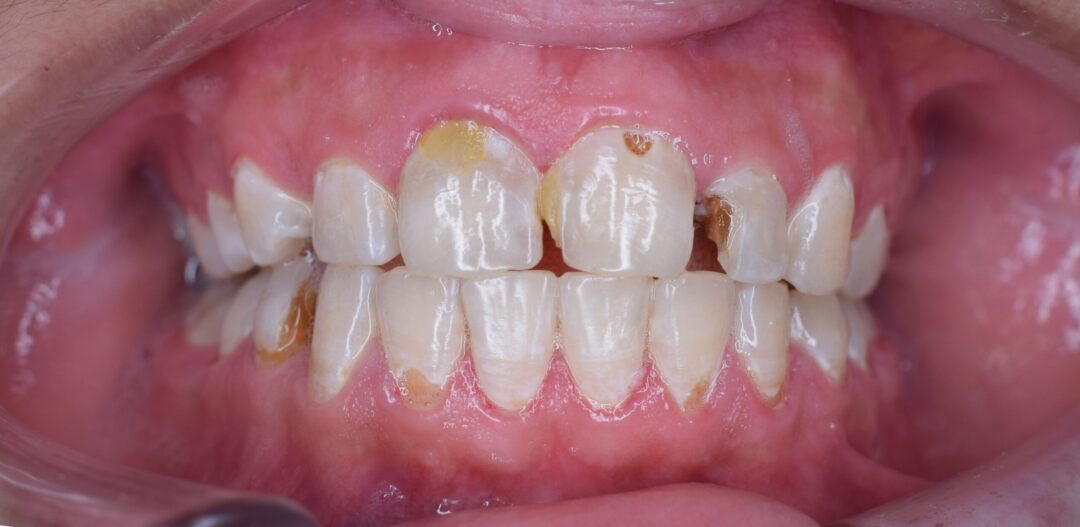
To prevent oral problems caused by stress, it’s crucial to take steps to reduce stress levels, such as engaging in physical activities, practicing meditation and breathing techniques, or seeking help from specialized professionals. Additionally, maintaining good oral hygiene by brushing and flossing daily, and regularly visiting the dentist for check-ups, is essential.
In summary, stress can have a significant impact on oral health, increasing the risk of developing a range of issues including bruxism, periodontitis, dental caries, and bad breath. Therefore, adopting measures to reduce stress and taking proper care of oral health are crucial.

